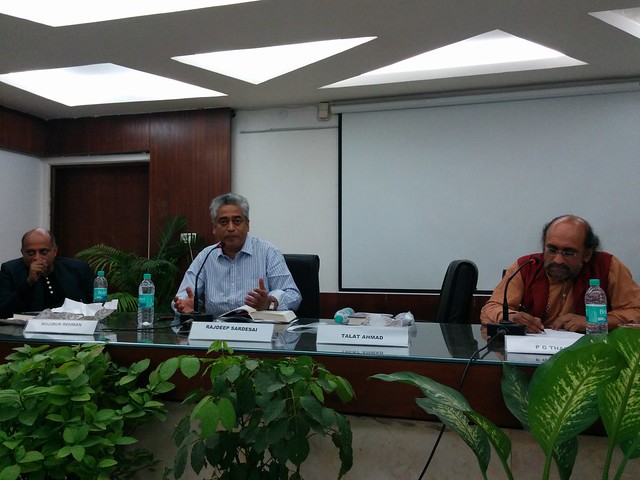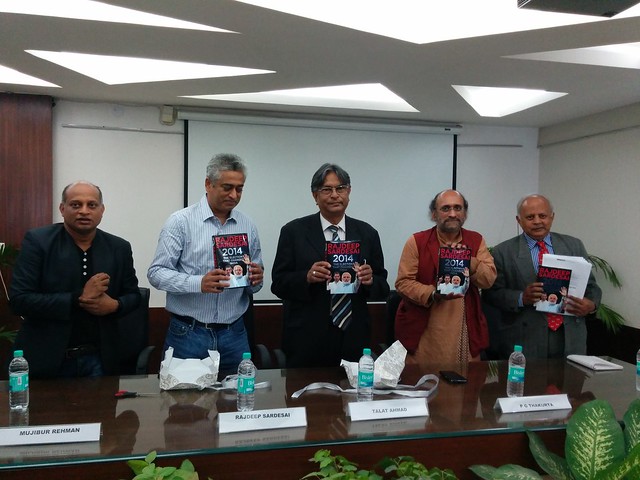It is bad time for media, where journalists who are supposed to ask questions are happy taking selfies with the PM, says the face of prime time TV News
By M Reyaz, TwoCircles.net,
New Delhi: No riot can take place without complicity or incompetence, or both, of the local administration and the 2002 Gujarat riot was no exception, said senior journalist Rajdeep Sardesai while responding to a question whether he has absolved (Prime Minister) Narendra Modi – who was then the Gujarat chief minister – in his book.
Sardesai was at the Jamia Millia Islamia to promote his book ‘2014: The Election That Changed India’.

Sardesai, in conversation with another senior journalist Paranjoy Guha Thakurta, said his book is not about 2002, but about 2014 and although he deals with the 2002 riots and how he himself was once caught among the rioters while returning from Gandhinagar after interviewing Modi then.
He has, in his book, suggested that Modi was still not in full control of Gujarat and that the cadres of the VHP led by Pravin Togadia were leading havoc in the state in 2002 in the aftermath of the Godhara train burning and thus he might not have been complicit in the riot, but incompetent as he had taken charge of the state just four months ago. Modi should have accepted this, said Sardesai, adding, but he will never do this as it is not in his nature to accept his shortcomings.
Earlier, Sardesai spoke about how anger against corruption, strong anti-incumbency factor and the silence of then PM Manmohan Singh, made Modi what he is with his decisive leadership image. He suggested that Modi should send six thank you cards – one each to Manmohan Singh, Rahul Gandhi, (Uttar Pradesh chief minister) Akhilesh Yadav, (NCP leader) Ajit Pawar (for his ‘urinating in dams’ comment), senior Congress leader Mani Shankar Aiyar (for his snobbish and elitist Chai wala statement) and the media.
Sardesai, who was with the Netowrk18 group as Editor in Chief till a few months ago, said the media did not directly help him win the election, but it certainly did play a critical role. “Media has become amoral,” and it will broadcast what it feels will sell, he said, adding, somewhere in 2013, media realised that Modi can hit TRPs and hence they became sort of cheer-leaders. “If Mr Modi was the Pied Piper, media became the orchestra and provided surround sound,” he said, adding, the media today has been reduced to “loud speakers.”
When reminded how during Indira Gandhi’s time, when ‘editors were asked to bend, they crawled’, he laughed and said the only difference now is that “the proprietors ask you to bend and they (the media) start crawling.” He also noted how the Corporates – many of whom have direct control in several media houses – had overwhelmingly supported Modi.

Asked if journalists are increasingly wearing their ideologies on collars and that is reflected in their work too, he agreed and said this is increasingly becoming the case in the society, irrespective of the field.
“It’s bad time for media,” he later said, elaborating the precarious situation media professionals are, when those who are pro-Modi and are trying for favourable posts are regarded as good-media while journalists such as him, who have tried to be as objective and taken a centrist position, are immediately dubbed as “paid-media”.
There was a time when media was supposed to ask questions, now they are happy taking selfies with Modi, he said.
The MMAJ-Academy of International Studies, JMI and Penguin Books India, the Publisher of Sardesai’s book had organised the programme where Prof Prakash, Director, MMAJ-Academy of International Studies, JMI, and Dr Mujibur Rehman, KR Narayan Centre for Dalit & Minorities Studies, JMI, also expressed their views on the book. Prof Talat Ahmad, JMI Vice-Chancellor, was also briefly present.

